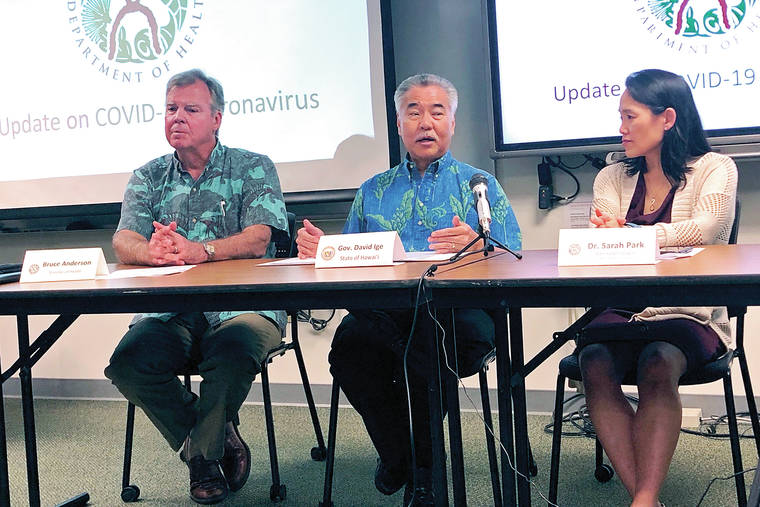A Japanese man who traveled to Hawaii earlier this month has since been diagnosed with COVID-19, the newly identified coronavirus that has infected thousands in China and elsewhere around the world, state health officials confirmed Friday.
State Health Director Bruce Anderson said during a news conference that the Department of Health was notified Friday morning by the U.S. Centers for Disease Control and Prevention that an adult male traveled from Japan to Maui Jan. 28-Feb. 3 and then to Oahu Feb. 3-7.
The man returned to Aichi Prefecture and developed more serious symptoms, for which he sought medical care.
Anderson said the man was asymptomatic while on Maui, but developed cold-like symptoms while on Oahu, but no fever.
“As soon as the Department of Health was notified (Friday) morning, we began to gather information and work on tracking any close contacts. … It’s those individuals who we are most concerned about. As far as we know, the disease is not transmissible unless you become symptomatic, and then you’re worried mostly about people who are in close contact with the individual for prolonged periods of time.”
According to Anderson, the man stayed at the Grand Waikikian by Hilton Grand Vacations while on Oahu, and as far as the state is aware, he did not seek medical treatment in Hawaii.
The DOH also is sending out medical advisories to all health care providers in the state to be on alert for possible cases.
Anderson said the DOH is still gathering information about the man’s travel history while in Hawaii.
State Epidemiologist Sarah Park said it should be reassuring that the man didn’t present symptoms while on Maui and only respiratory symptoms while on Oahu.
“That’s somewhat reassuring to us, because we know that when you have the fever, you’re probably more likely to be more infectious,” she said. “However, as a precaution, we are working with partners to identify potential close contacts because we know the risk is for those who have the prolonged, face-to-face close contact … .”
Information was still limited Friday afternoon.
Park said the DOH is working with the Japanese consulate and CDC to determine the man’s exact itinerary.
“If you’ve had fleeting, sort of in passing, you passed in the hallway, that is not our focus,” she said. “Our focus is who this person might have sat down with, had conversation with — those are the kind of things we’re looking for.”
Because he became ill while in Hawaii, Park said it’s assumed the man, who was traveling with his wife, became infected while still in Japan or in transit.
Once those individuals are identified, Park said those individuals would be notified and monitored at home, or quarantined if necessary.
“We do believe that this is a serious concern, and I just want to assure you that this scenario is exactly what we’ve been preparing for and are prepared for to respond,” Gov. David Ige said at the start of the news conference. “I have every confidence that all of our partners … are fully aware, and we do have systems and protocols in place to respond to this situation.”
COVID-19 was first detected in Wuhan, Hubei province, China, on Dec. 31.
Common coronaviruses in humans usually cause mild to moderate upper-respiratory tract illnesses, like the common cold, according to the CDC.
Symptoms of the newly identified virus include mild to severe respiratory illness with fever, cough and difficulty breathing. At this time, the CDC believes symptoms might appear 2-14 days after exposure.
Nearly 67,000 cases, largely in China, have been confirmed, and more than 1,500 deaths have been reported.
There have been 15 cases confirmed in the United States.
Email Stephanie Salmons at ssalmons@hawaiitribune-herald.com.



